Becoming Obsessed with Bikes
Tagged: bike diy opinionIn 2021, I started getting into cycling. Like, really into cycling. Or more accurately, getting into bicycles. Cycling conjures up images of men in skintight spandex riding $2000 carbon fiber framed bicycles with garish brand names plastered all over the thick tubing.
I’m definitely not that – I’ve never ridden in anything but street clothes, and getting around on a bike for me has been more about pleasure or utility than fitness. But despite not being a capital C Cyclist, it’s safe to say I’m still very obsessed with bicycles.
In the Fall of 2020 my bike had its wheels stolen while I was visiting a friend downtown. When winter rolled around and I ended up mostly stuck at home, my bike up shoved unceremoniously in my storage room. I didn’t want to spend money on a new wheelset - they’re expensive, after all. I also didn’t have anywhere to go, as visits to family and friends were soon prohibited and I wasn’t commuting to work. I took a lot of long walks that winter, mostly to break up the routine of self-isolation and working from home. I tend to spend a lot of my time walking down back alleys, keeping an eye open for useful trash (I’ve been meaning to write a sort of trash picking etiquette guide, maybe you’ll see one on here eventually), so naturally I kept my eyes open, hoping to find a trashed bike to plunder for its wheels.
At this point, it might be important to note, my car had been stolen and shortly after recovered by the police. It was a 1998 Honda Civic Sedan, notoriously easy to steal. When they recovered it, I had to jump through a bunch of hoops and pay a bunch of money to even see it in the impound lot. And when I finally did, it was clear that it was beyond totaled. So I was carless, at least for a while. And a little bit resentful towards cars. I always hated driving and tried to find a way to avoid it in my everyday life.
Eventually, I found a wheelset. It was in a residential dumpster of a soon-to-be-bulldozed house. I took it home, double checked the sizes and found they were 700C wheels, just like my trusty old commuter.
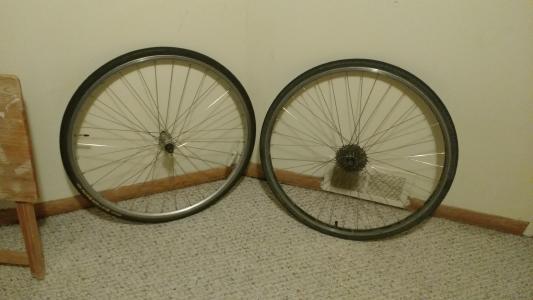
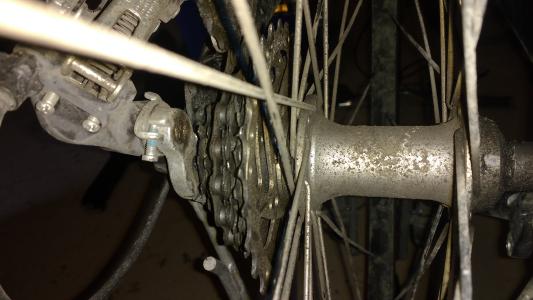
The only problem was that these had a 7-speed cassette on the back, while my old one had an 8-speed. I installed them anyways. With some adjustment, they worked fine. (As long as I didn’t shift too far and take the chain off the sprockets.) In spring, I rode my bike to my friend’s house, and took his advice in buying a new chain and 8-speed cassette. We worked together in his garage to install and tune my gearing. He also gave me a new stem to replace my worn and constantly loose adjustable stem, among a few other small improvements.
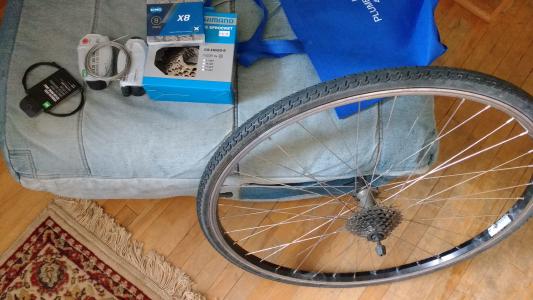
While we were at it, we also replaced my (At this point 8 year old) brake pads, gave the whole thing a much needed cleaning, replaced the chain (which was as old as the brake pads), and installed new cables. The person who stole my wheel also cut my rear brake cable. For no real reason, I guess. I’m not bitter.
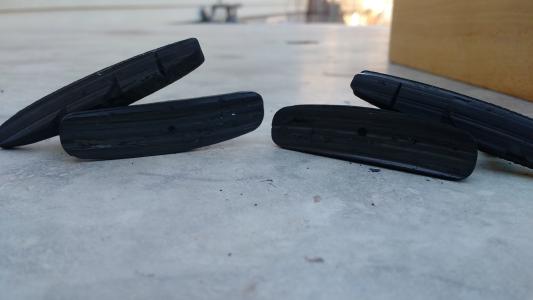
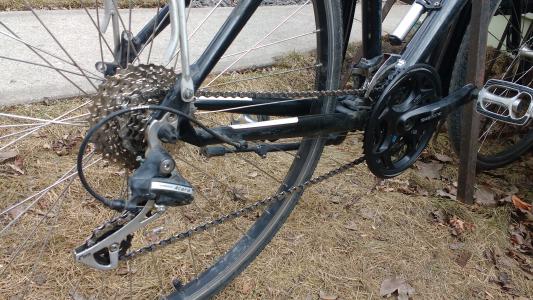
This was my first major service on a bicycle. Sure, I had changed tires and replaced tubes and adjusted my brakes. I had installed a rack. I had swapped out my grips when they started to fall off. But nothing at this scale.
This experience sort of changed everything. Spending a few hours tinkering in my friend’s garage, breaking for drinks and a trip to the bike shop to buy a tool, and eventually re-assembling, tuning, oiling, and getting my bike running better-than-new. The ride home was fantastic. For the first time in maybe five years, things were running smoothly. And having done it out of my friend’s garage using a scrapped wheelset, some parts from his various parts bins, and a few new odds and ends only added to the satisfaction. It was all over for me after that. I would probably never be Normal about bikes again.
Spending thousands on a top of the line road or mountain bike is fine for some, I’m sure. But patching up your daily commuter with garbage so you can go explore the city while cheating your way out of burning gas and being stuck in traffic? Profoundly satisfying.
I went far over the next few days. I’d visit friends and family on a bike. I’d explore restaurants and cemeteries and strip malls and side streets that I’d never have been able to reach. I started to build a better mental map of my city.
But for the most part, I just expanded the scope of my back alley walks - I could bomb down alleys much faster on a bike. And I had panniers and a rear rack and a whole slew of bungee cords. I could find things, strap them down, and take them home. One of my proudest moments of trash picking involved carrying a bookshelf home on that bike by resting it on one of the pedals, tying it to the seatpost, and walking the bike at an angle.
At the start of the pandemic, bikes were sold out everywhere. Supply chain issues plus a desire to get outside meant that everyone wanted a bike, and no shops had them in stock. Bike parts were expensive, though I had managed to luck out and dodge the worst of that with my wheelset. But it seems like a funny thing happened the following year. People started getting rid of their bikes. Sites like facebook marketplace and kijiji exploded with secondhand bikes. People also started getting rid of their old, decrepit, shitty bikes. Those ones weren’t worth anything, so they started showing up in the trash instead.
That’s about when I started finding them. And I still find them regularly. It became a hobby - find an almost-working bike in the trash, take it home, and figure out how to make it work. If I couldn’t, I’d just take the whole thing apart and put the pieces in labeled plastic bags and cardboard boxes. I started looking for bikes to give to my friends who didn’t have any. I started to buy special tools for assembly and disassembly. In about a year of looking, I’ve taken home 14 bikes, and probably left behind an equal number.
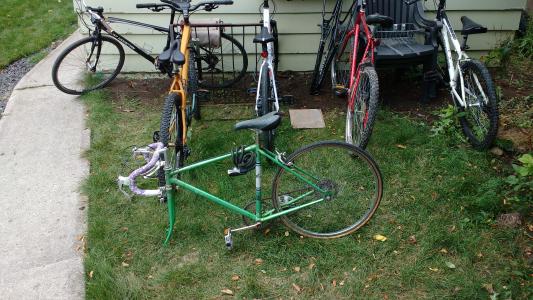
You don’t get good bikes doing this. Bikes broadly fall into two categories for me: department store bikes, and bike shop bikes. Department store bikes (sometimes called BSOs, or Bike Shaped Objects by enthusiasts, because they look like a bike and move like a bike but don’t function like a bike) are cheaply made bikes that are sold for a couple hundred dollars at department stores such as Walmart or Canadian Tire. Generally the components are terrible. They’re prone to breaking down, and even when running properly, they tend to rattle and skip gears.
Bike shop bikes, on the other hand, are real bikes. They’re something that a dedicated bike shop would carry. Generally, they start at $400 to $600, but there’s really no upper limit on how expensive they can be. A more enthusiastic cyclist (one who wears lycra probably) might argue for a third category, a performance category, but I wouldn’t know anything about that. I think the jump from BSO to bike shop bike is a HUGE leap that anyone would notice, and anything past that starts to get diminishing returns for the money.
Besides, by my estimate I’ve never found anything worth more than $700 in the trash. And I’ve got no interest in spending thousands on a bike, so I’m likely never going to interact with this hypothetical performance category. With only a few exceptions, everything I find in the trash is a mountain bike from 1985 to 1995, with 26" wheels and rim brakes of some variety. That’s just what my city has to offer, so that’s largely what I’m building.
And of course, in learning to build bikes, I decided I’d get some books out of my local library. Books about maintaining and repairing bikes, yes, but also books about cycling in general. Cycling history. Guides to urban cycling. Road etiquette. Unconventional bike builds. What makes good cycling infrastructure. Investigating some of the best cities in the world for cycling. I got a bit radicalized by it and suddenly I found myself very passionate about it.
To me it’s this: The idea that you can get around, quickly and quietly, without any licensing requirements, regardless of your age, on a machine that you build and service and maintain yourself, is liberating.
The fact that you can jury rig and craft your own bike bags and racks and fenders makes them a wonderful outlet of creativity and self expression.
And riding a bike itself - being out in the open air, moving quietly through greenery and alongside rivers, never being stuck in traffic, going slow enough to sightsee, and getting good exercise – it’s nice enough to warrant going out without even having a destination in mind.
Bicycles are a tool of personal independence, creativity, peace, and freedom. They are truly wonderful machines.